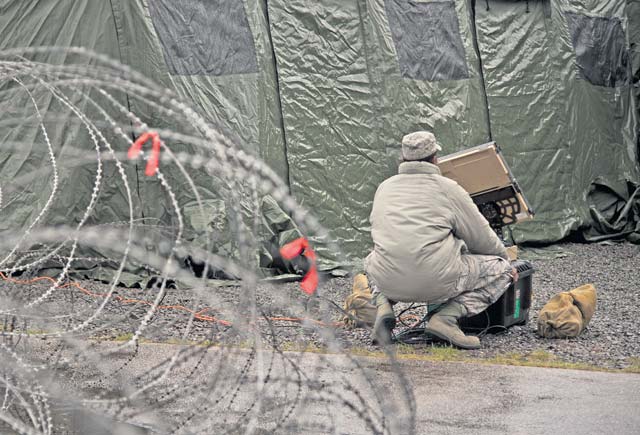
Ramstein Airmen and Army Soldiers from Rhine Ordnance Barracks came together Jan. 19 on Ramstein to take part in a joint communications exercise and establish bilateral communications across the two services’ networks.
Code-named Juniper Thunder, the exercise was aimed to help improve the interoperability between Air Force and Army combat communications systems. The 17-day effort also tested how well the two services could work together to support the European Command’s No. 1 priority in Air Ballistic Missile Defense.
Working inside the tents were Airmen from the 1st Combat Communications Squadron, 1st Air and Space Communications Operations Squadron, and U.S. Air Forces in Europe and Air Forces Africa, and Soldiers from the 10th Army Air Missile Defense Command.
“Traditionally, 1st CBCS doesn’t interact with our Army brethren in the same manner as we have during this exercise,” said 1st Lt. Francis Gudez, 1st CBCS lead exercise evaluation team member. “It’s a great experience for our Airmen to have this interaction and change our thought process from one of a separate ‘blue and green’ force to a joint ‘purple’ force. In real world operations, we are expected to work jointly and these Juniper Thunder exercises prepare us for that moment.”
Made up of 70 military personnel and more than $40 million worth of equipment, Juniper Thunder presented realistic scenarios to help identify complications within the networks used between the partnering services.
“Being a part of Juniper Thunder and exercises like it help identify interoperability issues in a controlled environment,” said Army Capt. John Verwiel, 10th AAMDC. “Now, we are working to fix those concerns during the exercise, so we don’t have these issues when we deploy together and fight.
“Undergoing a shared experience with our Air Force counterparts will add to the common understanding of the global security climate in which we operate,” Verwiel continued. “Training together now will help foster a more secure setting downrange.”
During the exercise, the 3rd Air Force and 17th Expeditionary Air Force commander, Lt. Gen. Darryl Roberson, as well as director of C4/Cyber, U.S. European Command, Brig. Gen. Welton Chase Jr., visited and spoke with Airmen and Soldiers to better understand what processes can be improved upon.
“It is important for us to locate any problems and address it with upper leadership before they occur during a real world mission,” said Airman 1st Class Cyrus Marvin, 1st CBCS network operations technician. “Each unit here, Air Force and Army, provides a significant level of support in a virtually seamless operation, and can only strengthen it by eliminating any imperfections found.”
Though Juniper Thunder was scheduled to end Thursday, the Airmen and Soldiers will continue to reinforce their joint capabilities and sustain their role in providing the combatant command the tools necessary to make the right decision, at the right time.


